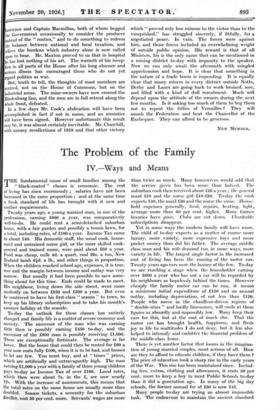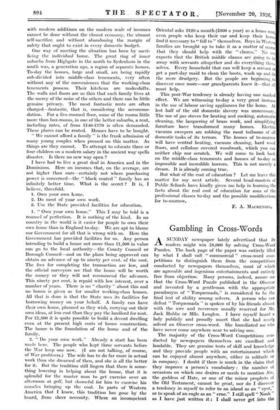The Problem of the Family
IV.—Ways and Means
THE fundamental cause of small families among the " black-coated " classes is economic. The cost of living has risen enormously ; salaries have not been increased in the same proportion ; and at the same time a fresh standard of. life has brought with it new and costlier requirements.
Twenty years ago, a young married man, in one of the professions, earning £800 a year, was comparatively well-to-do. He could rent a .semi-detached suburban house, with a fair garden and possibly a tennis lawn, for a total, including rates, of £100 a year. Income Tax came to about £40. His domestic staff, the usual cook, house- maid and untrained nurse girl, or the more skilled cook- general and trained nurse, were paid about £60 a year. Food was cheap, milk 4d. a quart, coal 26s. a ton, New Zealand lamb 6d. a lb., and other things in proportion. When the children reached school age, expenses, it is true, rose and the margin between income and outlay was very narrow. But usually it had been possible to save some- thing ahead for this time. Ends could be made to meet: His neighbour, living down the side street, went more modestly on between £850 and £500 a year. But even he contrived to have his first-class " season " to town, to keep up his library subscription and to take his month's summer holiday at the seaside.
To-day the outlook for these classes has entirely changed and family life is a matter of severe economy and anxiety. The successor of the man who was earning £350 then is possibly earning £450 to-day; and the successor of the £800 man is possibly receiving £1,000. These• are exceptionally fortunate. The average is far lower. But the house that could then be rented for £60 a year now costs fully £100, when it is to be had, and houses to let are few. You must buy, and at " times " prices, which are artificially and extravagantly high. The man earning £1,000 a year with a family of three young children pays to-day an Income Tax of over £106. Local rates, which then were about 7s. in the £, are now nearly 12s. With the increase of assessments, this means_ that the total rates on the same house are usually 'more than doubled. - Season ticketa, if necessity for the suburban dwellei, cost 50 per cent. more. Servants' wages are more than twice as much. Many housewives would add that the service giveh has been more than halved. The suburban cook then received about £26 ayear ; the general maid £18 and the nurse girl £18420. To-day the cook expects £40, the maid £86 and the nurse the same. House- hold expenses generally, food, repairs, heating, light, average more than 60 per cent. higher. Many former luxuries have gone. Clubs are cut' down. Charitable subscriptions disappear.
Yet in some ways the modern family will have more. The child of to-day expects as a matter of course more luxury, more variety, more expensive toys and more pocket money than did his father. The average middle class man and his wife demand too, in some ways, more variety in life. The largest single factor in the increased cost of living has been the coming of the motor car. Twenty years ago cars were the luxury of the few. To-day we are reaching a stage when the householder earning over £600 a year who has not a car will be regarded by his neighbours as hopelessly behind the times. However cheaply the family motor car can be run, it means a minimum initial expenditure of £150 and an annual outlay, including depreciation, of not less than £120. People who move in the chauffeur-driven regions of " double-sixes " and lordly limousines, will smile at these figures as absurdly and impossibly low. Many keep their cars for this, but at the cost of much else. That the motor car has brought health, happiness, and fresh joy in life to multitudes I do not deny, but it has also helped to intensify and embitter the financial problem of the middle-class home. _ There is yet another factor that looms in the imagina- tion' of young married 'couples, most serious of all. How are they to afford to educate children, if they have them ? The price of education took a sharp rise in the early years of the War. This rise has been maintained since. Includ- ing fees, extras, clothing and allowances, it costs 50 per cent. more to keep a boy in most Public Schools to-day than it did a generation ago. In many of the big day schools, the former annual fee of £80 is now £45.
Many people to-day are trying an almost impossible task. The endeavour to maintain the ancient standard with modern additions on the modern scale of incomes cannot be done without the closest economy, the utmost self-sacrifice and without abandoning the margin of safety that ought to exist in every domestic budget.
One way of meeting the situation has been by sacri- ficing the individual home. The great ring of inner suburbs from Highgate in the north to Sydenham in the south was, a generation ago, a region of separate homes. To-day the houses, large and small, are being rapidly sub-divided into middle-class tenements, very often without any of the conveniences that the working-class tenements possess. Their kitchens are makeshifts. The walls and floors are so thin that each family lives at the mercy of the noise of the others and there can be little genuine privacy. The most fantastic rents are often charged—fantastic, that is, considering the accommo- dation. For a five-roomed floor, some of the rooms little more than box-rooms, in one of the better suburbs, a rent, including rates, of from £140-1170 is often demanded. These places can be rented. Houses have to be bought.
" We cannot afford a family " is the frank admission of many young couples when pressed on this matter. As things are they cannot. To attempt to educate three or four children on a modern salary in the ancient way spells disaster. Is there no new way open ?
I have had to live a great deal in America and in the Dominions. Here on incomes that, on the average, are not higher than ours—certainly not where purchasing power is concerned—the " black coated " family has an infinitely better time. What is the secret ? It is, I believe, threefold.
1. Own your own home.
2. Do most of your own work.
3. Use the State provided facilities for education.
1. " Own your own home." This I may be told is a counsel of perfection. It is nothing of the kind. In no country in the world is it easier for people to own their own home than in England to-day. We are apt to blame our Government for all that is wrong with us. Here the Government has provided facilities for us. Any person intending to build a house not more than £1,500 in value can go to the local authority—the County Council or Borough Council—and on the plans being approved can obtain an advance of up to ninety per cent. of the cost. The fees for completing the transaction are low, and the official surveyors see that the house will be worth the money or they will not recommend the advance. This ninety per cent. is repaid with low interest, over a number of years. There is no " charity " about this and no bonus is given as for smaller working-class houses. All that is done is that the State uses its facilities for borrowing money on your behalf. A family can have their own home, planned as they wish, carrying out their own ideas, at less cost than they pay the landlord for rent. For £1,500 it is quite possible to build a decent dwelling even at the present high costs of house construction. The house is the foundation of the home and of the family.
2. " Do your own work." Already a start has been made here. The people who kept three servants before the War keep one now. (I am not talking, of course, of War profiteers.) The wife has to do far more in actual work than she dreamed of then, and she is all the better for it. But the tradition still lingers that there is some- thing lowering in helping about the house, that it is splendid for the master man to get exercise over an afternoon at golf, but shameful for him to exercise his muscles bringing up the coal. In parts of Western America that I know, this tradition has gone by the board, from sheer necessity. Where an incompetent Oriental asks $120 a month (£3oo a year) as a house man, even people who keep their car and keep their horses find it necessary to " fall to " themselves. Boys in Western families are brought up to take it as a matter of course that they should help with the " chores." No one expects that the British middle classes are going to do away with servants altogether and do everything them. selves. Every household that can will keep a servant or get a part-day maid to clean the boots, wash up and do the mere drudgery. But the people are beginning ,to discover once more—our grandparents knew it—that all must help.
This post-War tendency is already having one marked effect. We are witnessing to-day a very great increase in the use of labour saving appliances for the home. At lest half of the old domestic slavery was unnecessary, The use of gas stoves for heating and cooking, automatic cleaning, the lacquering of brass work, and simplifying furniture have transformed many homes. Electric vacuum sweepers are robbing the most toilsome of all domestic tasks of its terrors. The homes of to-morrow will have central heating, vacuum cleaning, hard wood floors, and cellulose covered woodwork, which you can neither chip nor scratch. We will come to look back on the middle-class tenements and houses of to-day as impossible and incredible horrors. This is not merely a dream. It is.already coming true.
But what of the cost of education ? Let me leave this matter for my next article. Several head-masters of Public Schools have kindly given me help in learning the facts about the real cost of education for sons of the professional classes to-day and the possible modifications for to-morrow.
F. A. MACKENZIE.































































 Previous page
Previous page